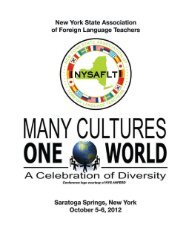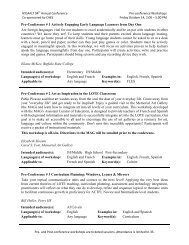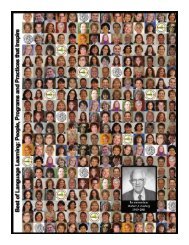NASBE<strong>THE</strong> <strong>COMPLETE</strong> <strong>CURRICULUM</strong>Chapter 1Introduction <strong>and</strong> SummaryRecommendations:The Importance of <strong>the</strong> <strong>Arts</strong> <strong>and</strong>Foreign LanguagesState policymakers have investedunprecedented resources in recentyears developing st<strong>and</strong>ards <strong>and</strong>accountability systems to improveteaching <strong>and</strong> learning, <strong>and</strong> policymakers<strong>and</strong> practitioners alike are hopefulthat <strong>the</strong> impact of st<strong>and</strong>ards-basedre<strong>for</strong>m will improve student achievementnationwide. But, with moststates emphasizing accountability inonly a few academic subjects, many areconcerned that teachers, schools, <strong>and</strong>districts are emphasizing those fewsubjects at <strong>the</strong> expense of o<strong>the</strong>rimportant components of a comprehensiveeducation, such as <strong>the</strong> arts <strong>and</strong><strong>for</strong>eign languages.The passage of <strong>the</strong> No ChildLeft Behind Act of 2001 (NCLB) hasfur<strong>the</strong>r raised concerns about <strong>the</strong>narrowing of <strong>the</strong> curriculum. WhileNo Child Left Behind includes both<strong>the</strong> arts <strong>and</strong> <strong>for</strong>eign languages as partof a core curriculum, many fear that<strong>the</strong>re is an unintended consequence:that states will focus <strong>the</strong>ir attention—<strong>and</strong> resources—on complying with<strong>the</strong> law’s primary emphasis onreading, math, <strong>and</strong> science, to <strong>the</strong>detriment of o<strong>the</strong>r curricular areas. Aseducators <strong>and</strong> policymakers focus onleaving no child behind, many arewondering whe<strong>the</strong>r our nation’sschools may inadvertently leave halfof <strong>the</strong> child’s education behind.Overwhelmingly, parents <strong>and</strong> <strong>the</strong>public at large support a comprehensiveeducation: one that includeshistory, civics, geography, <strong>for</strong>eignlanguages, <strong>and</strong> <strong>the</strong> arts, in addition too<strong>the</strong>r core subjects such as English,ma<strong>the</strong>matics, <strong>and</strong> science. 1 Whe<strong>the</strong>r<strong>the</strong> label is a well-rounded education,a liberal arts education, or a comprehensiveeducation, <strong>the</strong> goal is <strong>the</strong>same: to prepare students <strong>for</strong> <strong>the</strong>working world, <strong>for</strong> <strong>the</strong>ir roles <strong>and</strong>responsibilities as citizens in ademocracy, <strong>and</strong> to prepare <strong>the</strong>m <strong>for</strong>life in an increasingly interdependent<strong>and</strong> culturally diverse world.In 2003, <strong>the</strong> board of directors<strong>for</strong> <strong>the</strong> National Association of StateBoards of Education charged <strong>the</strong>Study Group on <strong>the</strong> Lost Curriculumwith examining <strong>the</strong> currentstatus of curriculum in our nation’sschools, particularly as regards <strong>the</strong>arts <strong>and</strong> <strong>for</strong>eign languages. After ayear of intense study, <strong>the</strong> groupdrew several important conclusionsabout <strong>the</strong> status of <strong>the</strong>se subjects, aswell as some key recommendations<strong>for</strong> state policymakers.First, <strong>the</strong> Study Group concludedthat <strong>the</strong>re is a substantialbody of research that highlights <strong>the</strong>benefits of including <strong>the</strong> arts <strong>and</strong><strong>for</strong>eign languages in <strong>the</strong> curriculum.For example, one study of third-,fourth-, <strong>and</strong> fifth-grade students inLouisiana found that those whoreceived daily instruction in a <strong>for</strong>eignlanguage outper<strong>for</strong>med those whodid not on <strong>the</strong> Louisiana Basic SkillsTest, regardless of race, gender, oracademic level. Similar studies havefound that actively engaging in <strong>the</strong>arts increases academic achievement,as well.4
<strong>Ensuring</strong> a <strong>Place</strong> <strong>for</strong> <strong>the</strong> <strong>Arts</strong> <strong>and</strong> Foreign Languages in America’s SchoolsSecond, while <strong>the</strong> Study Groupon <strong>the</strong> Lost Curriculum found that <strong>the</strong>arts <strong>and</strong> <strong>for</strong>eign languages are notnecessarily “lost,” <strong>the</strong>se subject areashave often been marginalized, <strong>and</strong> areincreasingly at risk of being lost aspart of <strong>the</strong> core curriculum. Forexample, while virtually every state hasadopted st<strong>and</strong>ards in <strong>the</strong> arts, only afew have incorporated <strong>the</strong> subject into<strong>the</strong>ir state accountability systems.Similarly, nearly all states requireschools to offer coursework inlanguages, however, that hasnot translated into instructionaltime that is equal tothat of o<strong>the</strong>r subjects, such asma<strong>the</strong>matics or English.Perhaps most alarming arecurrent education re<strong>for</strong>ms,which have inadvertentlyplaced <strong>the</strong> arts <strong>and</strong> <strong>for</strong>eignlanguages at risk as policymakers<strong>and</strong> administrators,as <strong>the</strong>y comply with newfederal requirements,choose to narrow <strong>the</strong>curriculum in order to reach higherstudent achievement results in a fewsubjects.To address <strong>the</strong>se two keyconclusions, <strong>the</strong> Study Group on <strong>the</strong>Lost Curriculum <strong>for</strong>mulated tenrecommendations <strong>for</strong> state policymakersto ensure that <strong>the</strong> arts <strong>and</strong><strong>for</strong>eign languages are not lost, <strong>and</strong>more importantly to position both asintegral parts of <strong>the</strong> core curriculum.1. Adopt high-quality licensurerequirements <strong>for</strong> staff in <strong>the</strong> arts <strong>and</strong><strong>for</strong>eign languages that are alignedwith student st<strong>and</strong>ards in <strong>the</strong>sesubject areas. This is a critical juncturebecause of <strong>the</strong> requirements NCLBhas placed on states to ensure a highlyqualified teacher in every classroom.How states will alter licensure requirements<strong>for</strong> arts <strong>and</strong> <strong>for</strong>eign languageteachers remains unclear. What is clearis that NCLB provides state policymakerswith an opportunity to setrequirements <strong>for</strong> teachers of <strong>the</strong> arts<strong>and</strong> <strong>for</strong>eign languages that will ensurehigh-quality instruction.2. Ensure adequate time <strong>for</strong> highqualityprofessional development <strong>for</strong>staff in <strong>the</strong> arts <strong>and</strong> <strong>for</strong>eign languages.State education officialsshould help to establish relationships“Children learn better with arts as partof <strong>the</strong> curriculum. They learn all <strong>the</strong>irsubjects better. They’re more engaged.Teacher attendance goes up. The childis happier; <strong>the</strong> teacher is happier.”Jane Alex<strong>and</strong>er, <strong>for</strong>mer chair,National Endowment <strong>for</strong> <strong>the</strong> <strong>Arts</strong> 2between local school districts <strong>and</strong>universities in order to provide arts<strong>and</strong> language teachers with anadequate system <strong>for</strong> professionaldevelopment. Education leadersshould develop strong policies toensure teachers receive high-qualityprofessional development.3. Ensure adequate staff expertise at<strong>the</strong> state education agency to work in<strong>the</strong> areas of <strong>the</strong> arts <strong>and</strong> <strong>for</strong>eignlanguages. It is important to designatestaff to focus solely in each of<strong>the</strong>se areas to provide assistance,implement policy, <strong>and</strong> to ensurecompliance.4. Incorporate both <strong>the</strong> arts <strong>and</strong><strong>for</strong>eign languages into core graduationrequirements, while simultaneouslyincreasing <strong>the</strong> number ofcredits required <strong>for</strong> graduation.State policymakers should incorporateboth <strong>the</strong> arts <strong>and</strong> <strong>for</strong>eignlanguages into core graduationrequirements, while simultaneouslyincreasing <strong>the</strong> number of creditsrequired <strong>for</strong> graduation. This willallow students some leeway indeciding which courses to take, whileproviding seniors an importantopportunity to experience <strong>the</strong> arts<strong>and</strong> <strong>for</strong>eign languages during what hasbecome “down time” <strong>for</strong> studentsnearing graduation.5. Encourage highereducation institutionsto increase st<strong>and</strong>ards<strong>for</strong> admission <strong>and</strong>include arts <strong>and</strong><strong>for</strong>eign languagecourses when calculatinghigh school gradepoint averages. WhileK-12 policymakers maynot have authority to setcollege admissionsrequirements, <strong>the</strong>y can develop apolicy that requires <strong>the</strong> inclusion ofarts <strong>and</strong> <strong>for</strong>eign language course infiguring high school grade pointaverages.6. Incorporate arts <strong>and</strong> <strong>for</strong>eignlanguage learning in <strong>the</strong> early yearsinto st<strong>and</strong>ards, curriculum frameworks,<strong>and</strong> course requirements. Also,encourage local school districts toincorporate <strong>the</strong> arts <strong>and</strong> <strong>for</strong>eignlanguages into instruction in <strong>the</strong> earlyyears, whenever possible. Earlychildhood education is just beginningto earn <strong>the</strong> recognition it deserves as acritical key to student achievement inlater years. Recently, federal, state, <strong>and</strong>local policy <strong>and</strong> practice has begun torecognize <strong>the</strong> benefits of earlyintervention, instead of waiting tointervene after a child has fallen5






